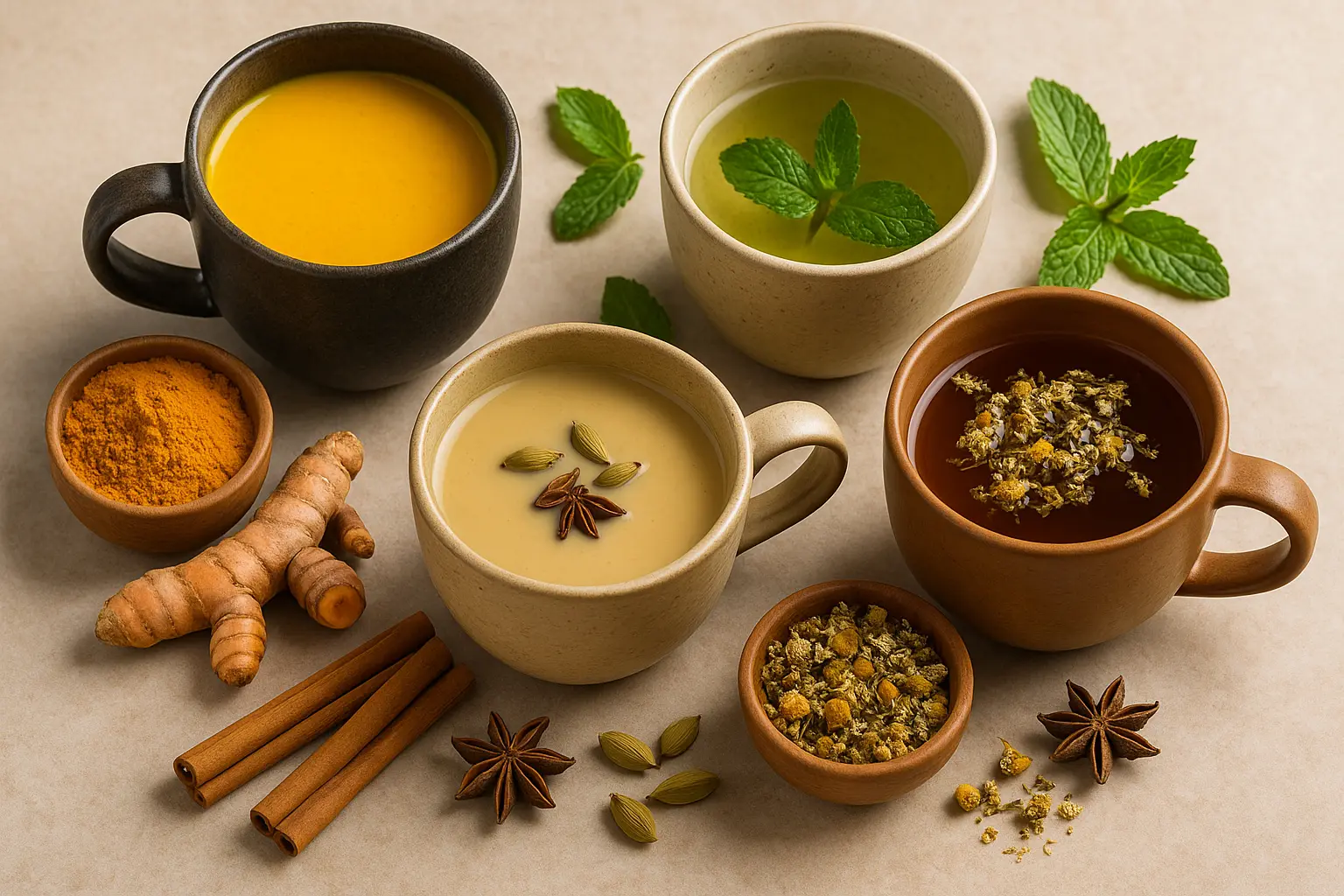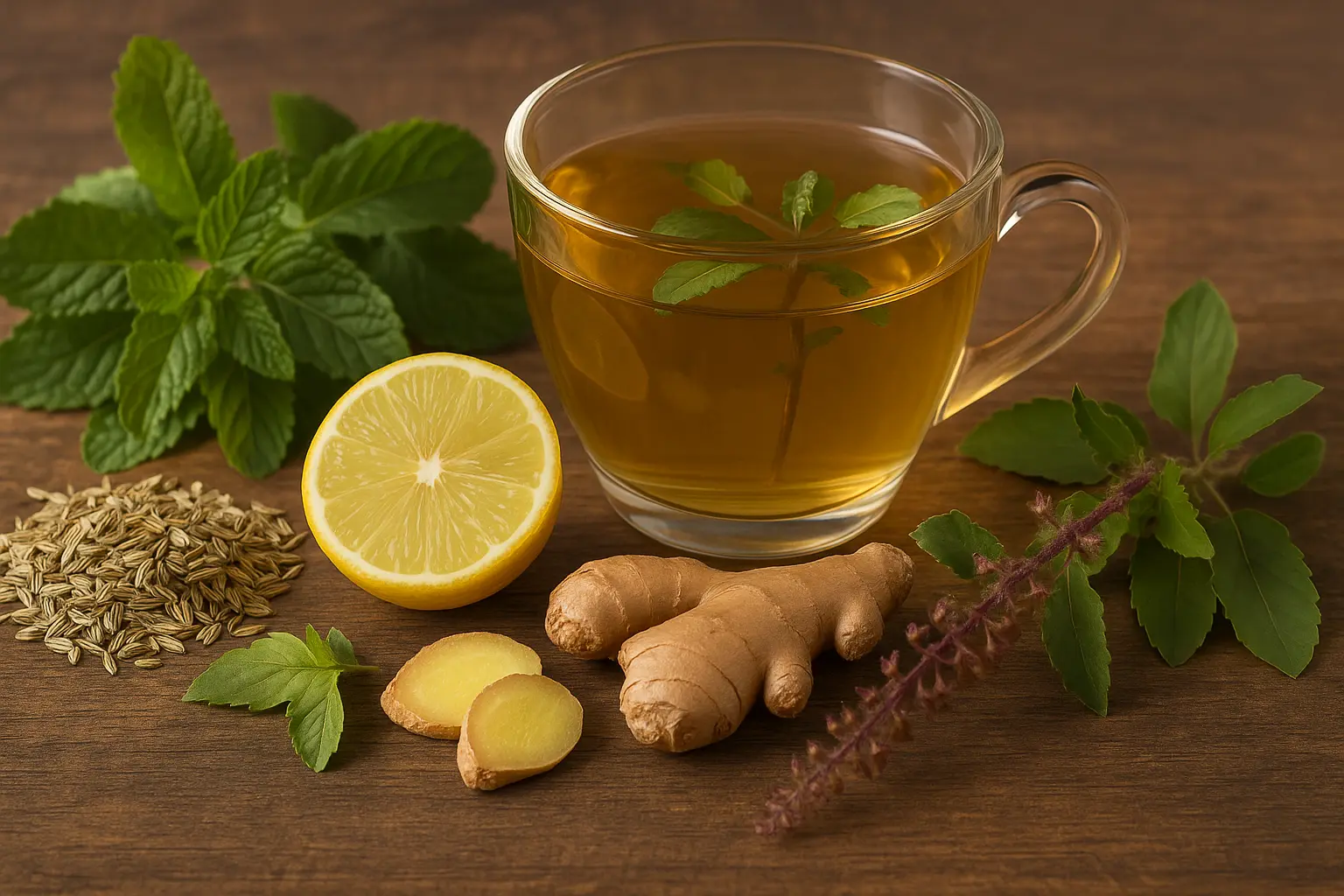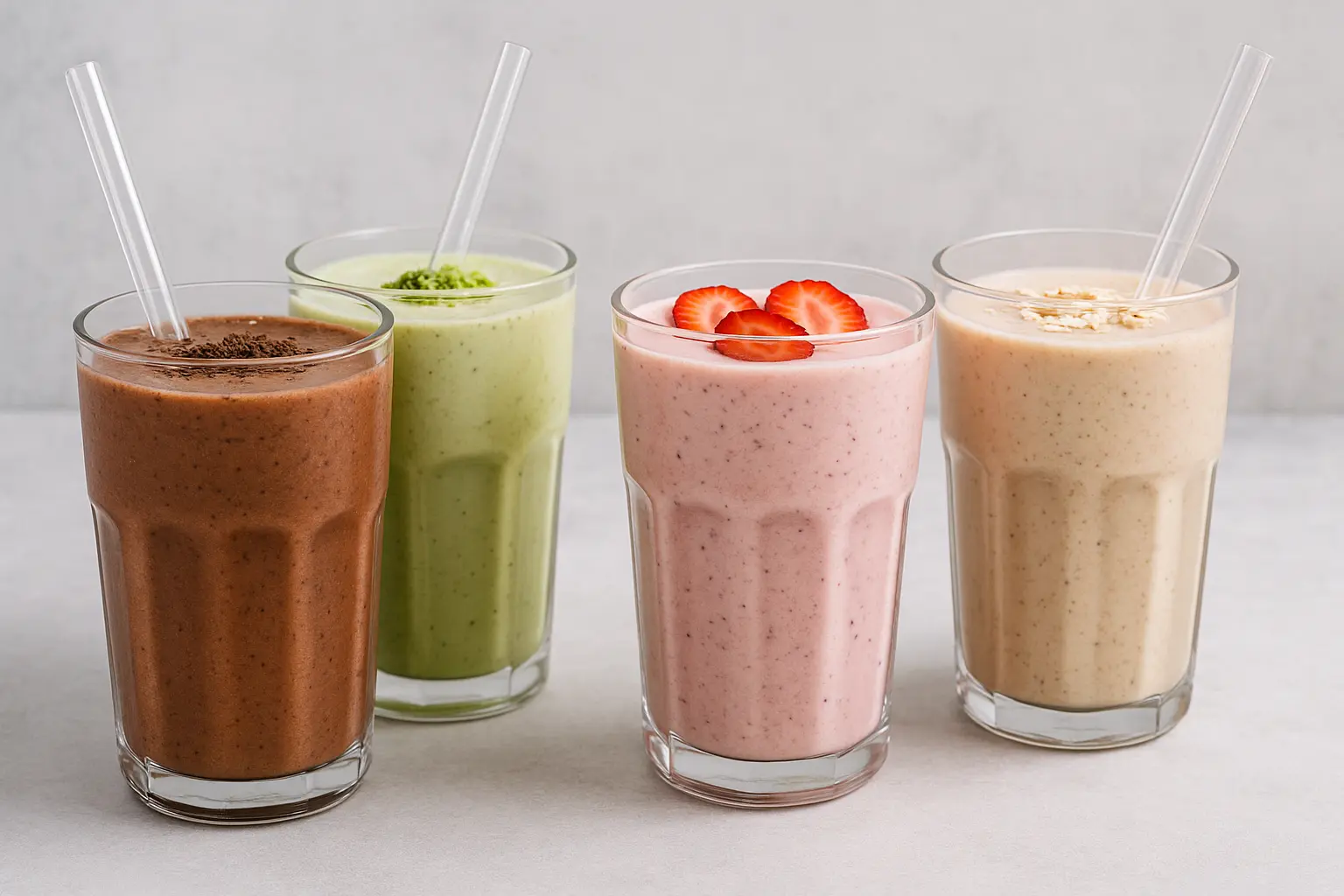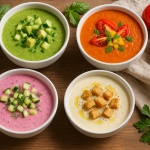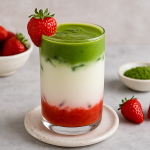Ayurveda, the 5,000-year-old holistic healing system from India, teaches us that true wellness comes from balance—between body, mind, and spirit, as well as within nature’s cycles. Teas infused with herbs and spices are among Ayurveda’s simplest and most effective tools for maintaining daily health. Unlike modern caffeinated or sugar-loaded drinks, Ayurvedic teas are crafted with natural ingredients designed to align with your body’s unique constitution (dosha) and seasonal needs.
This article explores the essence of Ayurvedic teas: their principles, health benefits, and practical recipes you can prepare at home. We’ll also dive into how these teas support digestion, immunity, detoxification, and emotional balance—making them ideal companions for modern busy lives.
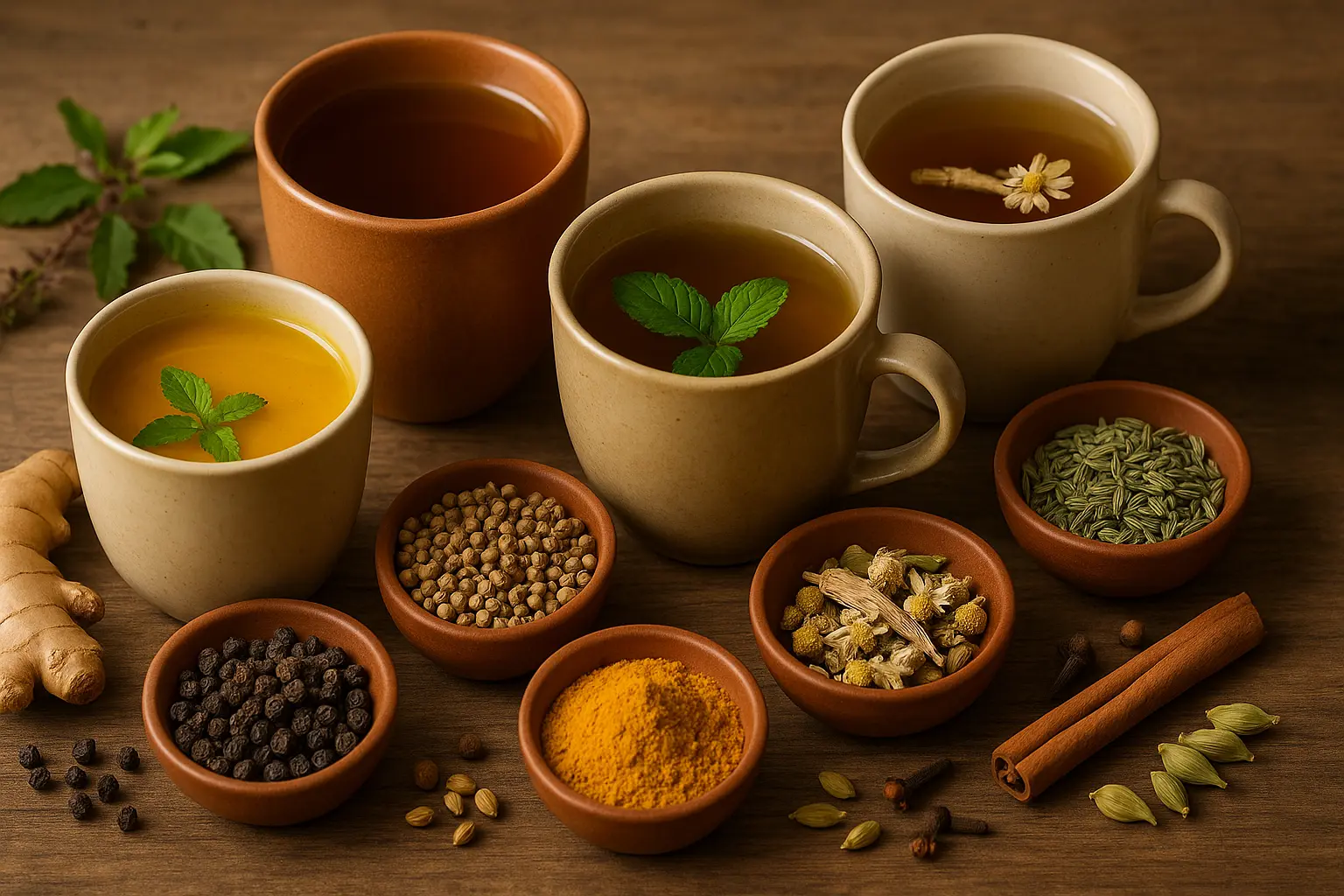
Part 1: Ayurvedic Foundations of Healing Teas
The Role of Doshas
Ayurveda identifies three bio-energies, or doshas—Vata, Pitta, and Kapha—that govern the body’s functions. Everyone has a unique constitution, but teas can help balance excesses:
- Vata (air + ether): Prone to dryness, anxiety, and coldness. Needs warming, grounding teas with spices like ginger, cinnamon, and fennel.
- Pitta (fire + water): Prone to heat, irritability, and acidity. Needs cooling teas with mint, rose, licorice, and coriander.
- Kapha (earth + water): Prone to sluggishness, congestion, and heaviness. Needs stimulating, detoxifying teas with tulsi, black pepper, clove, and turmeric.
Why Tea Is Central in Ayurveda
Hot water alone is considered therapeutic in Ayurveda—it aids digestion and cleanses tissues. Adding herbs and spices enhances these effects. Unlike Western “herbal teas,” Ayurvedic teas are functional blends designed with intention.
Part 2: Health Benefits of Ayurvedic Teas
- Improved Digestion – Cumin-coriander-fennel tea helps reduce bloating and promotes nutrient absorption.
- Stronger Immunity – Tulsi and turmeric teas build resilience against infections.
- Detoxification – Triphala tea assists in gentle cleansing of the digestive tract.
- Calming the Mind – Ashwagandha and chamomile teas soothe the nervous system.
- Weight Balance – Cinnamon and ginger teas stoke metabolism without overstimulating.
- Better Sleep – Nutmeg, cardamom, and chamomile blends encourage restful nights.
- Seasonal Support – Cooling teas for summer, warming teas for winter, balancing teas during seasonal transitions.
Part 3: Everyday Ayurvedic Tea Recipes
Below are practical recipes you can prepare with common kitchen ingredients. Each recipe serves 2 cups unless noted otherwise.
1. Digestive Trifecta Tea (Cumin-Coriander-Fennel)
- 1 tsp cumin seeds
- 1 tsp coriander seeds
- 1 tsp fennel seeds
- 2 cups water
Method: Boil all seeds in water for 5 minutes, strain, and sip warm.
Benefits: Reduces bloating, gas, and indigestion.
2. Immunity-Boosting Turmeric Tulsi Tea
- 1 tsp fresh grated turmeric (or ½ tsp powder)
- 5 fresh tulsi leaves (or 1 tsp dried)
- 1 tsp grated ginger
- 2 cups water
- ½ tsp honey (optional, add after cooling slightly)
Method: Simmer herbs for 7 minutes, strain, and drink warm.
Benefits: Strengthens immunity and fights inflammation.
3. Cooling Pitta Pacifier Mint-Rose Tea
- 1 tbsp dried mint leaves
- 1 tsp dried rose petals
- 1 tsp licorice root (optional)
- 2 cups hot water
Method: Steep herbs in hot water for 10 minutes. Strain and enjoy.
Benefits: Cools excess body heat, calms irritability.
4. Kapha-Reducing Spiced Ginger Tea
- 2 tsp grated ginger
- ½ tsp black peppercorns, crushed
- 2 cloves
- 2 cups water
- Lemon juice to taste
Method: Simmer spices in water for 8 minutes. Add lemon juice before drinking.
Benefits: Clears congestion, boosts circulation, and awakens dullness.
5. Ashwagandha Relaxation Tea
- 1 tsp ashwagandha root powder
- 1 tsp cinnamon
- 2 cups water or milk (for richer taste)
- ½ tsp jaggery (optional)
Method: Simmer gently for 10 minutes, strain, and sip warm.
Benefits: Calms anxiety, reduces stress, promotes sound sleep.
6. Triphala Cleansing Tea
- ½ tsp triphala powder
- 1 cup hot water
Method: Stir triphala powder into hot water, steep for 5 minutes, drink before bed.
Benefits: Supports detox, regular elimination, and eye health.
7. Chai-Style Ayurvedic Tea
- 2 cups water
- 1 cup milk (or plant-based)
- 1 tsp black tea leaves
- 1 tsp ginger, crushed
- 2 cardamom pods
- 1 cinnamon stick
- 2 cloves
- ½ tsp nutmeg
- Jaggery or honey to taste
Method: Simmer spices with water, add tea leaves, milk, and sweetener. Strain.
Benefits: Energizing, aromatic, balances Vata and Kapha.
Part 4: Ayurvedic Teas by Season
- Summer: Mint-rose, coriander-cumin-fennel, hibiscus tea.
- Winter: Ginger-cinnamon-clove, ashwagandha-nutmeg, turmeric-milk tea.
- Monsoon: Tulsi-ginger-black pepper blends to prevent infections.
- Spring: Detoxifying triphala or cumin-coriander-fennel teas.
Part 5: Practical Tips for Daily Tea Rituals
- Consistency matters: Drink 1–2 cups daily rather than large amounts occasionally.
- Timing: Digestive teas are best after meals; calming teas before bed; stimulating teas in the morning.
- Sweeteners: Ayurveda favors natural options like honey or jaggery in moderation. Avoid adding them to boiling liquids—let the tea cool slightly.
- Mindful sipping: Ayurveda emphasizes not just what you drink, but how. Sip slowly, seated, and with awareness.
Part 6: Modern Wellness Meets Tradition
While Ayurveda is ancient, its principles are deeply relevant to today’s health challenges—stress, poor digestion, weak immunity, and insomnia. Modern research supports the medicinal value of many Ayurvedic herbs:
- Turmeric – anti-inflammatory, antioxidant.
- Tulsi (Holy Basil) – adaptogen, stress reliever, antimicrobial.
- Ginger – digestive aid, anti-nausea, circulation booster.
- Ashwagandha – reduces cortisol, improves sleep.
Blending tradition with modern science, Ayurvedic teas offer a natural, side-effect-free path to wellness.
Conclusion
Ayurvedic teas are more than just hot beverages; they’re daily acts of self-care rooted in ancient wisdom. By aligning herbs and spices with your body’s constitution and seasonal needs, you can transform simple tea rituals into powerful wellness practices. Whether you seek better digestion, immunity, calmness, or energy, there’s an Ayurvedic tea for you.
Start with one recipe today—sip mindfully, notice the difference, and let Ayurveda become part of your everyday wellness journey.
Leave a comment
Your email address will not be published. Required fields are marked *


